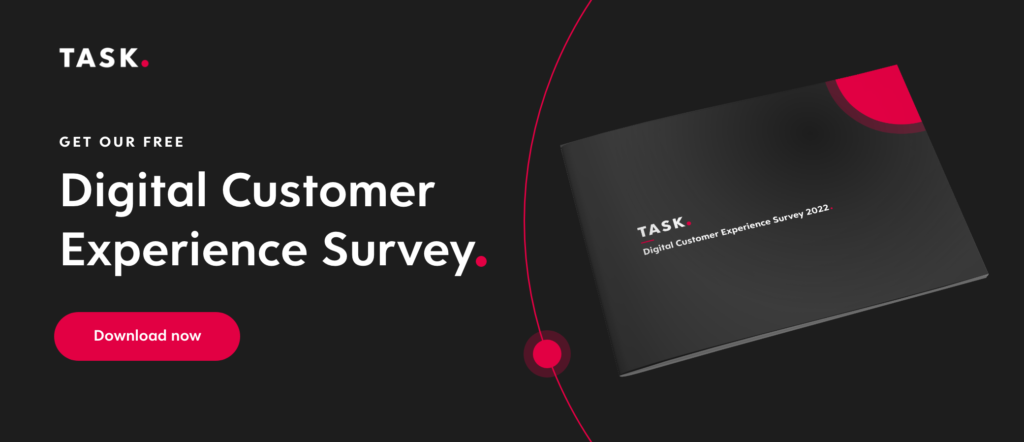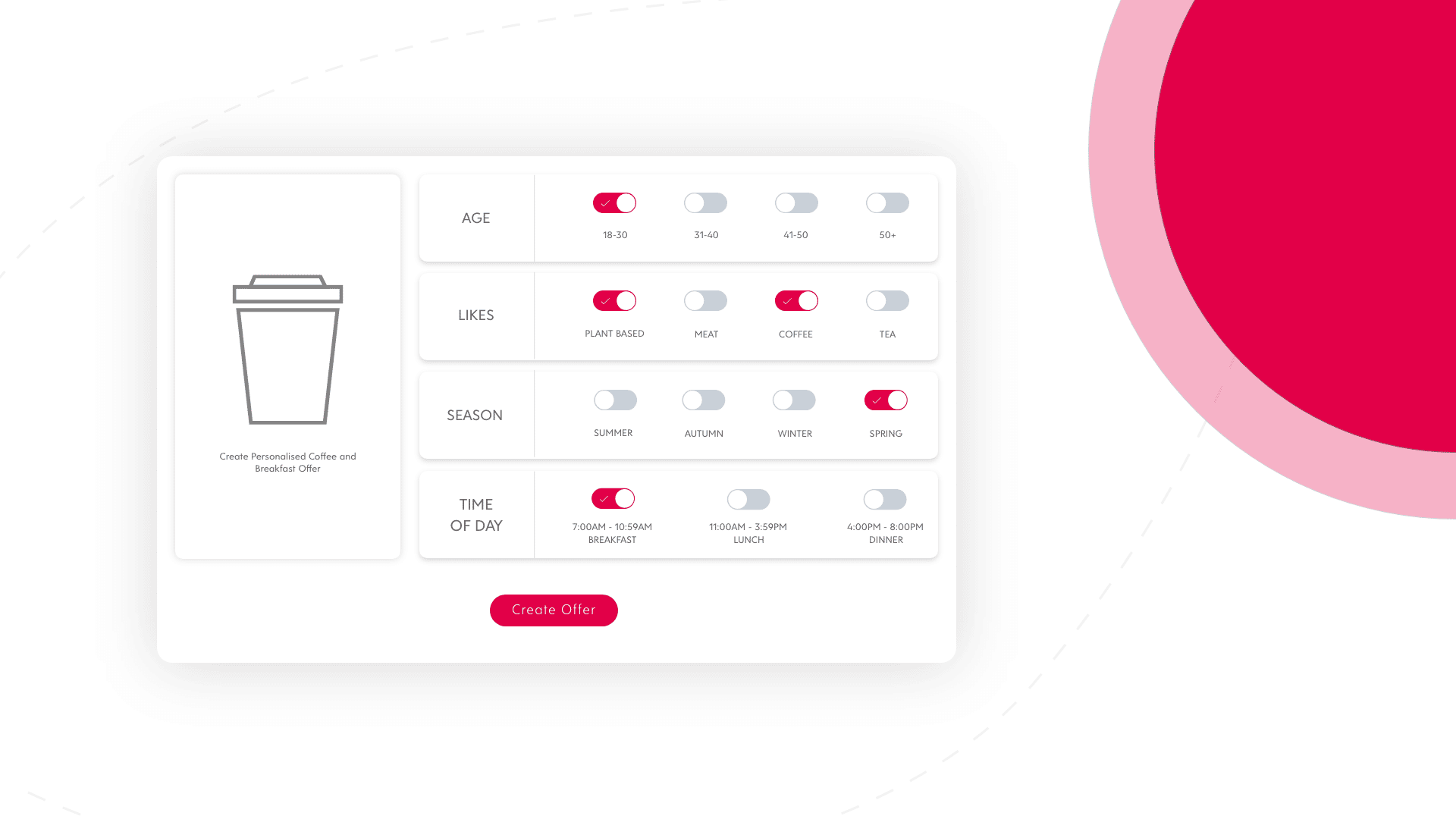In a post-pandemic world, people are turning to digital channels to form connections, spend their time, and make purchase decisions. Whether it’s finding their next romantic partner or figuring out what they’ll have for dinner, technology is at the forefront of everything we do.
With so much of our lives online, customers expect more personalized experiences – with a staggering 91% of consumers reporting that they’re likely to shop with brands that provide offers and recommendations that are relevant to them. The challenge for brands is standing out as an authentic, relatable presence amongst the wash of content.
That’s where personalized offers can help retailers develop a sustainable competitive advantage to building long-term customer loyalty. When customers feel that a company is listening to their specific wishes, they are far more likely to trust and desire products from that brand.
Here’s what you need to know about personalized offers and building emotional connection in your brand’s digital marketing strategy.
What Is Personalization Technology?
In short, personalized offers target individual customers with purchase options tailored to their interests and needs. It’s more than just a generic email with a name copied at the top. Instead, personalized promotions can form an emotional connection between brands and their customers.
Personalized offers are often built on customer behaviors already collected by the brand – such as birthdays, order preferences, or location.
The more specific the offer is to a customer’s individual situation, the better personalized (and therefore influencing) it will be.
Everything You Need To Know About Personalized Customer Engagement
Here’s what you need to know right now about personalization and building better relationships with future customers.
Levels of Personalization Efforts
The level of personalization for a specific offer changes depending on the size of the intended audience. For most retailers, a higher level of personalization with smaller audiences requires more complex technology. The more personalized, the better the benefit to consumers. That’s why it’s essential to fully utilize data science to predict what level of personalized marketing is the best investment.
There are five degrees of personalization, each requiring a different level of advanced technology. They are:
- Mass promotions
- Loyalty offers
- Targeted offers
- Personalized offers
- Individualized or hyper-personalized offers
Mass promotions
These offers are the most generic type of broadcast with little personalization. A mass offer may be advertised to an entire customer base and create value for any guest who frequents your business.
A mass offer might include a franchise-wide discount on the business’ anniversary. This kind of offer is low risk, as it benefits every customer who purchases from your brand over a specific period. However, a mass offer does little to demonstrate a personal, emotional connection or boost customer acquisition.
Loyalty offers
A loyalty offer is a slightly more focused type of mass offer. They typically narrow their scope to a particular product line or service or increase customer engagement in a specified aspect of the brand. A loyalty offer might include a two-for-one deal on sides, or a free size increase on drinks when you buy a full meal.
Loyalty offers are available to all customers, making them beneficial to a substantial proportion of guests. They don’t, however, help retailers demonstrate a personal connection to loyal customers.
Targeted offers
Targeted offers have a specific target audience in mind, such as only loyalty program members or consumers in a certain age group. They can also demonstrate awareness for a particular social group and spark word-of-mouth marketing. For example, targeted rewards could include free dessert for moms on Mother’s Day or a discount to students during graduation season. These kinds of offers focus more on the customers and their purchase history, rather than on menu items.
This level of personalization can achieve a range of marketing objectives – whether it’s appealing more to a certain demographic, promoting your brand’s social identity, or making a time-sensitive connection that shoppers expect.
Targeted offers depend on data collected to determine who to contact. It’s important to remember that the better your data acquisition, the more accurate your targeted offer will be.
Engage Your Guest Using Omnichannel Integration and Personalization
Restaurant guests expect a personalized digital experience. Innovating brands must connect with guests to introduce changes that drive both sales and profit.
Personalized offers
These offers are a targeted or loyalty offer that uses individual customer data to determine their timing. A classic example of a personalized promotion is a birthday giveaway, relevant for each customer only at a particular time. They are an invitation-only style offer that makes sense to individual guests and will help them feel remembered.
Personalized rewards aren’t necessarily unique in what they offer, but rather when they are offered to customers. This means that using accurate data is essential.
Individualized/hyper-personalized Offers
The highest offer level is one-to-one personalization. Ideally, individualized offers are unique based on information about one person. Using loyalty programs to collect data on multiple channels can help collect more comprehensive customer segments – such as their age, gender, order history, and location. For example, retailers could offer a customer who regularly redeems loyalty points a bonus stack as a thank-you for their business. Hyper personalization offers the most specific marketing and are therefore the type of offer most likely to build personal, meaningful relationships with more customers.
They do, however, pose some risk for retailers. If the information being used to craft personalized experience is inaccurate, the resulting offer may come across as out of touch or disingenuous. That’s why it’s important to invest in quality, integrated restaurant technology that can consistently collect and collate the right data.
What Can Personalized Offers Do for Retailers?
The research really does say it all: personalization improves sales, customer retention, and conversion rates.
Building personal relationships is the cornerstone of a memorable customer experience. In fact, according to McKinsey, more than 70 percent of consumers now consider a personalized experiences a basic expectation.
Studies show that companies using advanced personalization report 40 percent more of their revenue from personalization than their slower-growing counterparts. Psychologically, the more relevant an offer is to a person, the more valuable that purchase will seem.
What’s Next?
Meeting customers’ expectations in the hospitality industry are quickly moving towards better personalization and better relationships between brands and new customers. As your business grows, and your customer base broadens, it’s important to have a marketing plan for how to develop an emotional connection with your guests.
AI technology and gathering customer data can both help you provide better experiences for your customers and make your marketing initiatives more effective. Invest in the digital tools to stay ahead and continue building connections that help you grow.

